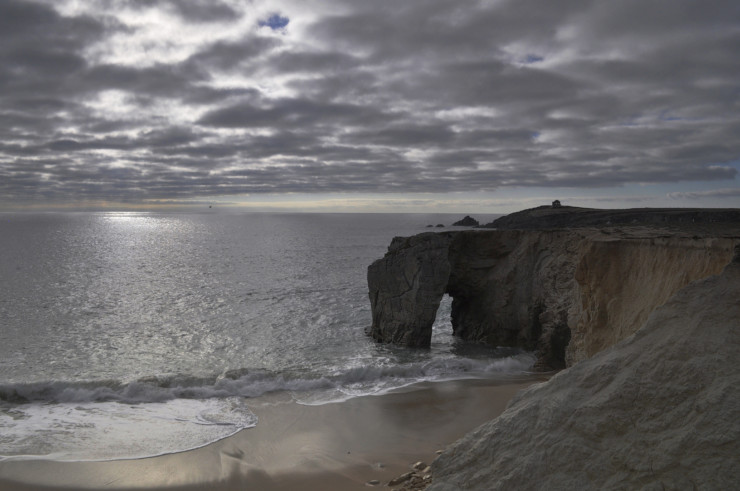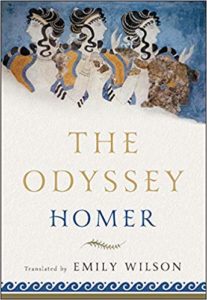I’ve been thinking about heroes as I completed reading Dr. Emily Wilson’s translation of Homer’s The Odyssey, which I’ve been reading along with the dudes at the Overdue podcast for almost a year.
Wilson, professor of classics and comparative literature at the University of Pennsylvania, has written a lean, mean, and exciting translation. Not only is it in iambic pentameter (and sounds the way a good poem should) but it’s also the exact number of lines as Homer’s epic, so it zips along.
It’s also more true to the reality of ancient life, circa 800 BC. Slaves are slaves, not maids or servants. Violence is rendered in sickening detail. And when Athena “poured / attractiveness” over Odysseus — twice — you can bet he’s going to have a very good day.
I knew I would love the book when Overdue hosts Andrew Cunningham and Craig Getting tagged Wilson on Twitter, so she’d know they were covering her translation. After she listened to the podcast she sent them a message, with compliments for finding the humor in the ancient tale, but also with this rebuke:
I have pronunciation guides for all the names in the glossary in the back, otherwise the meter gets totally messed up and the Muse starts quietly sobbing under her cloak (jk, she’s fine, doing well for her age).”
I finished The Odyssey in May, amid many other endings in pop culture: Game of Thrones, Veep, the Big Bang Theory, Avengers: Endgame. Endgame has remarkably fulfilling narrative arcs for two of its main characters, Iron Man and Captain America. Both Tony Stark and Steve Rogers grow as heroes. I left the movie feeling satisfied.
I did not leave The Odyssey that way. As Maryanne Wolf writes in Reader, Come Home, “I wish I could say there was a happy ending.” I think I’m unhappy because I wanted a similar emotional growth curve for Odysseus.
Odysseus starts as a trickster and a liar, and he ends that way. In the final chapter he lies to his own father, Laertes, because … because he’s Odysseus, and Odysseus lies. Sometimes he needs to lie; for example, to conceal his identity when facing danger. But sometimes, as with Laertes, it feels like he just can’t help himself. He’s “Hardened Odysseus,” and he’s our hero.
What is a hero, anyway?
Odysseus is one of the most well-known characters in the entire Western canon, with some of the best adventures ever written — with the Cyclops, the Sirens, and the dead. The epic ends with him getting to do the two things the audience has been waiting for: wreak revenge on the suitors (book 22) and reunite with his wife, Penelope (book 23).
That chapter, “The Olive Tree Bed,” is my favorite. We see Penelope — “wise Penelope,” “astute Penelope,” “cautious Penelope,” “careful Penelope,” the Penelope who “said shrewdly” — trick Odysseus, to make sure he is who he says he is. Which is a wise plan.
Despite the main characters’ obfuscation in this chapter, Wilson’s translation here is especially beautiful:
They would have wept until the rosy Dawn
began to touch the sky, but shining-eyed
Athena intervened. She held night back,
restraining golden Dawn beside the Ocean,
and would not let her yoke her swift young colts,
Shining and Bright.”
In Wilson’s discussion with Overdue, she says Odysseus is unique among heroes because the poem glorifies his “cunning and intelligence.” Wilson further explained saying this:
“It’s not necessarily courage. It’s not necessarily any of these other characteristics we think of as the hero’s characteristics. It’s his cunning and intelligence and the ability to think and scheme and lie your way out of any possibly dangerous situation. That’s the ability that he has more than any other hero in the mythic canon.”
Which brings me back to my first By Heart poetry memorization, of the end of “Ulysses” by Tennyson. In that poem Ulysses/Odysseus says, “that which we are, we are.” The man who is described this way in the first line of Wilson’s translation — “Tell me about a complicated man.” — ends the story a complicated man.
In her thorough and thoroughly fascinating introduction to her translation, Wilson describes the hero this way:
“Odysseus is a migrant, but he is also a political and military leader, a strategist, a poet, a loving husband and father, an adulterer, a homeless person, an athlete, a disabled cripple, a soldier with a traumatic past, a pirate, a thief and liar, a fugitive, a colonial invader, a home owner, a sailor, a construction worker, a mass murderer, and a war hero.”
In other words, he’s a man. He’s complicated. The fact that Homer and Wilson didn’t try to redeem him may be the most heroic act of all.
_______________
May Pages
Finished
Poetry
Voices in the Air: Poems for Listeners, Naomi Shihab Nye
Adult
Luckenbach Texas: The Center of the Universe, Becky Crouch Patterson
The Odyssey, Homer, translated by Emily Wilson
Early Readers and Picture Books
Cinco de Mouse-O, Judy Cox, illus. Jeffrey Ebbeler
Fungus the Bogeyman, Raymond Briggs
The Snowman, Raymond Briggs
Middle Grade and YA
Turtles All the Way Down, John Green
Made Progress
Circe, Madeline Miller
Photo by Evim@ge, Creative Commons, via Flickr. Post by Megan Willome.
Browse more Reader, Come Home
“Megan Willome’s The Joy of Poetry is not a long book, but it took me longer to read than I expected, because I kept stopping to savor poems and passages, to make note of books mentioned, and to compare Willome’s journey into poetry to my own. The book is many things. An unpretentious, funny, and poignant memoir. A defense of poetry, a response to literature that has touched her life, and a manual on how to write poetry. It’s also the story of a daughter who loses her mother to cancer. The author links these things into a narrative much like that of a novel. I loved this book. As soon as I finished, I began reading it again.”
—David Lee Garrison, author of Playing Bach in the D. C. Metro
- Perspective: The Two, The Only: Calvin and Hobbes - December 16, 2022
- Children’s Book Club: A Very Haunted Christmas - December 9, 2022
- By Heart: ‘The night is darkening round me’ by Emily Brontë - December 2, 2022



Glynn says
I have the Richard Lattimore translation (which dates me – it was published in 1963 and I bought it about 1970), and I’ve read good things about this one. I believe there’s a new translation of The Iliad out as well.
Reading for May
Fiction
Where the Desert Meets the Sea by Werner Sonne
Joy on This Mountain by Vikki Kestell
The Road to Grantchester by James Runcie
The Man from Yesterday by Florence Witkop
Throw Me to the Wolves by Patrick McGuiness
Perpetual Care: Stories by James Nolan
Adrift by Jaycee Weaver
When Winter Breaks Softly by Jim Burnett
The Secret Orphan by Glynis Peters
Poetry
The Threshold of Light by Michael Glaser
Evensong for Shadows by Shannon Powlus Wheeler
Ragged Anthem by Chris Dombrowski (second reading)
Herod’s Dispensations by Harry Clifton
Non-Fiction
Walt Whitman Speaks by Brenda Wineapple
Defiant Joy by Kevin Belmonte
Mystery
A Debt of Death of Jonathan Dunsky
The Montgomery Murder by Cora Harrison
The Deadly Fire by Cora Harrison
The Hudson Valley Mystery by Craig Stephen Copland
The Yellow Farce by Craig Stephen Copland
Beyond the Point by Damien Boyd
An ongoing project is a close reading of The Scarlet Letter by Nathaniel Hawthorne. I’m a bit more than halfway through the book, and it is turning out to be nothing like I remembered it when I read it in high school.
Megan Willome says
Glynn, I hope you write about your reread of The Scarlet Letter. I can tell you that rereading Jane Eyre this year really transformed that book for me. There’s something about being older, having more experience, that changes how we process stories.
Emily Wilson said she has started on The Iliad, but she’s having trouble figuring out what rhythmic scheme to use. She’s been experimenting.
Maureen says
This month’s poetry reading: T. [Tony] Crunk’s ‘To His Son’, ‘Living in the Resurrection’, and ‘New Covenant Bound’ (the latter I especially liked); Anders Carlson-Wee’s ‘The Low Passions’, Naomi Shihab Nye’s ‘The Tiny Journalist’, and Daniel Berrigan’s ‘And the Risen Bread’, which I’m dipping in and out of; ‘The Dreamers Anthology’, which I’m delighted to say includes my poem about Anne Frank; ‘Jim Harrison: Essential Poems’, which I just got (his work is as wonderful as his appetites were huge). I’m also reading Copper Canyon’s wonderful ‘Here: Poems for the Planet’; it includes a poem by Michaela Coplen, the young poet whose interview with me appeared here at Tweetspeak.
Finished Lynne Olson’s ‘Madame Fourcade’s Secret War’ (excellent nonfiction) and Valeria Luiselli’s excellent ‘Lost Children Archive’ (novel), which I’d picked up then stopped but started over and came to admire for its inventive approach and subject; and Daniel Ellsberg’s ‘The Doomsday Machine: Confessions of a Nuclear War Planner’ (I have one chapter left to read), which is about as unsettling as a book can be.
I also finished ‘Ninth Street Women’, a hefty and excellent read by Mary Gabriel about the artists Lee Krasner, Elaine de Kooning, Grace Hartigan, Joan Mitchell, and Helen Frankenthaler.
Waiting to be read: Ocean Vuong’s ‘On Earth We’re Briefly Gorgeous’ (he’s a terrific poet and I’m eager to get to this novel that is about his life); and Eliza Griswold’s ‘Amity and Prosperity’.
If I may, I’d like to add that Diane Lockward’s anthology ‘A Constellation of Kisses’ (originally to have been titled ‘A Compendium of Kisses’), which will be out in July, includes one of my poems.
Megan Willome says
Maureen, how fabulous that you have a couple of poems featured in different collections!
I need to read more Jim Harrison. He’s on my list because I’ve enjoyed many of his poems I’ve read individually.
Maureen says
Thanks, Megan. I don’t send out a lot but I’ve been trying to do more of that this year. The ‘Dreamers’ anthology has poems about Anne Frank and Martin Luther King Jr, who both would have been 90 this year. It has some wonderful poems in it.
The ‘Essential Poems’ has a good selection, I think. All of his work is still in print.
Megan Willome says
It’s wild to think of either of them at 90, much less both of them. What might they have had to say, with more time in their stories?
Sandra Heska King says
Well, you know I’ve been in kind of a writing funk lately. And I’m mostly only slicing books. I’m still buying them, though. Ha! So my to-read stack is getting higher and higher. I *am* currently reading (bouncing back and forth between) “Making a Literary Life” by Carolyn See, Killing Jesus by Stephen Mansfield, Nye’s Voices in the Air, and Christie Purifoy’s Placemaker.
We used to belong to a classics club a bazillion years ago and have two shelves of their books. I have great hopes for reading them all in my lifetime. The Odyssey (and Iliad) are prose translations by Samuel Butler, though. I think I’d prefer poetry.
Megan Willome says
Sandy, I think you would like this translation.
As you can see in my list, I just finished “Voices in the Air” and journaled through so many of the poems. I’m expecting to use them in future writing and speaking things. Nye is my kind of poet!